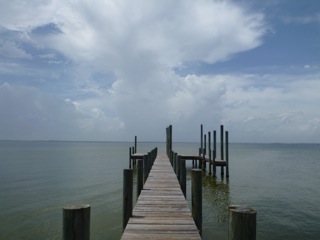It’s 7:30am, and I’m already tired. Partly it’s because I didn’t sleep well last night. You could say I was besieged by strange recurring dreams concerning gorillas and high schools. Since I’m in the process of registering my son to high school, that might explain the second part, but I’m still not sure about the gorillas. Partly, however, I’m so tired because I’ve contemplated my schedule this week, and I am dreading what I see.
Ever since I’ve come back from the meditation retreat in September, I’ve become more aware of how overwhelmed I feel inside my own life. So much happens every day. I feel responsible for so many things and people. The driving… don’t get me started on the driving. And all of it, I confess, is by choice. My choice. And the question begs, if this chaos is my choice, why am I not choosing otherwise?
My brother-in-law once told me a story about a teacher’s example for good time management. The teacher placed a large glass vase on the table and fit large rocks inside, up to the top of the vase. He then asked the students if the vase was full. Yes, they answered. The teacher took smaller rocks and let them tumble into the spaces between the large rocks. Is the vase full now, he asked the students. Yes, they said. The teacher poured pebbles into the vase. How about now? He asked. Yes. Then he poured in sand. Full? The students, now wise, wondered if maybe not? The teacher poured in water. Now the vase was truly full. The moral of the story was simple: we have to fill up our time with the biggest rocks first, what is most important, and only then down in size to the water. If we fill the vase with water first, then sand, then pebbles, we have no room for the big rocks.
So what are my big rocks? I always come back again and again to this question. The kids, of course, hiking and being outside, writing, spending time with Dar, my meditation and qigong. I also have smaller rocks that I do not wish to be without: reading, spending time with the dogs, cleaning for the chickens (I know this sounds strange, but it actually makes me feel more connected to the essential me, the earth-me), making music, spending time with friends, connecting with my family, exercising.
Then there are the things I do which are harder to classify: cooking, for example — is that a small rock or a pebble? It is important to me to eat healthy and organic. I would prefer not to eat at restaurants, but cooking takes up so much time, seemingly more than its share in the order of importance. And, to make everything more complicated, it is also closely related to the much bigger rock of spending time with and still taking care of the kids, in, once again, two opposing forces. I guess some of my rocks are just not so black and white in the size department.
Then there are other things, like doctors’ appointments, for example. If it was up to me, those would be sand, or maybe even water. But what if it’s a doctor’s appointment for the kids? And paying my bills, whether sand, water or pebble, is essential to living an orderly and responsible life with direct implication to my peace of mind and the well-being of the kids, myself, and Dar. Unlike my brother-in-law’s story, I have not been able to find a way to make all of my rocks come together snugly in the vase of my life. It’s always an either/or. Either I take the kids to the dentist, or we can go home and spend time together. Either I cook dinner, or I help them with homework. Either I write or I go for a hike. It is always choice.
I remember one of my first conversations with my therapist. I described to her all of these things which I would love to do and explained how if only I was more methodical, less lazy, more organized, more efficient, then I would be able to do all of them every day. Jeanne thought that it sounded exhausting. Sadly, she turns out to be right.
Here is a schedule of my dream day:
5am wake up
5:20-6:30am meditation and qigong
6:30am breakfast while reading
7:00am-9:45am hike
9:45-10:00 clean for chickens, water plants in yard
10:00am-11:30am write
11:30-12:30 play the ukulele and sing
12:30-1:00pm lunch
1:00pm-2:45pm prepare dinner
2:45-4 pick up kids from school
4-6:30 spend time with the kids, walk dogs
6:30-7 dinner
7:00-7:30 read french
7:30-8:30 showers, spend time with kids
8:30 go to sleep
Here’s what I didn’t put in there:
My Reiki stuff: sessions, planning classes, promoting my business, connecting with people
Hanging out with friends
Resting or even just pausing
Talking with my grandmother in Israel, connecting with my family
Writing this blog
Laundry
Loading and unloading the dishwasher
Registering Uri to high school
Exercising
Doctors appointments
Date night with Dar
Massage
Answering emails
Volunteering at school
Grocery shopping
And so much more.
As I am writing this, I am wondering if perhaps I could look a week in advance and schedule in some things which are important to me. I would love to write every day, but do I really need to hike every day? Perhaps three times a week is enough, and perhaps I could assure myself of having that time by physically penciling it into my calendar? Perhaps I could play the ukulele in the evening instead of the morning, freeing up an hour and sharing that activity with the kids? That hour could be used to put in-between activities, for much needed pausing or, perhaps, for the laundry.
Jack Kornfield often reads a poem by the poet Ryokan:
BEGGING
Today’s begging is finished; at the crossroads
I wander by the side of Hachiman Shrine
Talking with some children.
Last year, a foolish monk;
This year, no change.
I tend to agree about that for myself. Last year, a foolish Sigal. This year, no change. The more I live and the more I learn, the more I realize how little I know. I realize how some things which seemed so ultra-important to me in the past are not necessarily that important at all. I find myself getting back to the essential, that which truly is important to me: to love, to share that love with people around me, to be at peace and share that peace with people around me.
Perhaps that, in truth, is my one big rock, living with the intention to love. Everything else, whether I hike or write, whether I play or talk on the phone, whether I answer email or water the plants — do these things ever truly matter if they are not done from the heart? And is not even folding the laundry the most important thing, the biggest of all big rocks, if done with love?





